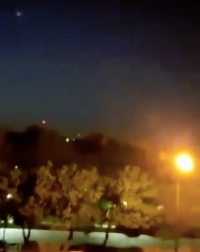
Photo source: X
New York/Tehran/Washington: Israel allegedly struck inside Iran today with its drones missing a nuclear power station in Isfahan, a city in central Iran. Iran’s state media reported that Iran shot down the three drones. There is no official confirmation of the strikes by Israel so far.
The International Atomic Energy Agency (IAEA) said there was no damage to the Iranian nuclear sites and stated it was monitoring the situation “very closely”.
While explosions were reported in Isfahan today early morning, reports quoting the Iranian military said they were related to the shooting of the drones by the anti-aircraft defence systems and that experts were investigating the dimensions of the issue.
Isafahan, which is home to Iranian nuclear facilities also has a major oil refinery, a large air force base, and Iran’s most advanced aircraft manufacturing plant, HESA, located outside the city.
Following reports of alleged Israeli strikes inside Iran near a nuclear power station, the United Nations Secretary-General António Guterres appealed to all parties to “stop the dangerous cycle of retaliation in the Middle East”.
“The Secretary-General condemns any act of retaliation and appeals to the international community to work together to prevent any further development that could lead to devastating consequences for the entire region and beyond,” he said in a statement issued by his Office.
IAEA Director-General Rafael Grossi urged “extreme restraint” from all sides, and stressed that nuclear facilities should never be a target in military conflicts. Without naming the attackers, he also referred to a further attempted drone attack on the training centre at Ukraine’s Russia-controlled Zaporizhzhya Nuclear Power Plant (ZNPP), which caused no damage or casualties.
Incidentally, the United Kingdom Foreign Minister David Cameron, after meeting Israel’s Prime Minister Benjamin Netanyahu in Tel Aviv on April 17, 2024, had dropped enough hints of an impending Israeli retaliation in response to Iran’s strikes on its territory on the night of April 13-14, 2024. “It’s clear the Israelis are making a decision to act,” Cameron reportedly said.
Last night, the United States of America had made it clear that it remained “fairly sceptical about Iran’s intentions given its continued and ongoing destabilizing and malign behaviour as recently as just this past weekend”. A US State Department spokesperson stated that Washington was not interested in getting into an all-out conflict with the Iranian regime, ” we’ll continue to work closely with partners and allies in the region, and around the world to continue to create a unified diplomatic response to Iran’s reckless and irresponsible behaviour over the course of this past weekend”.
Today in Capri (Italy), all that the US Secretary of State Antony J.Blinken said was that the “United States has not been involved in any offensive operations. The United States, along with our partners, will continue to work for de-escalation”. At the same time, he declared, “Israel makes its own decisions, but we have a commitment to defending it”.
The hostility with Iran was visible when the United States imposed additional travel restrictions on the delegation of Iranian Foreign Minister Hossein Amir-Abdollahian, who was in New York for meetings at the United Nations yesterday. This restriction permitted the delegation to move only within a two-block radius of the UN Headquarters district, between the UN and the Iranian mission to the UN, and the residence of the Iranian permanent representative to the UN and to John F. Kennedy International Airport.
While addressing an open debate in the UN Security Council in New York on “the situation in the Middle East, including the Palestinian Question” on April 18, 2024, Amir-Abdollahian, however, declared that ” Iran’s legitimate defence and proportionate and counteraction have terminated”. He added, “Therefore, the Israeli regime must be compelled to stop any further military adventurism against our interests”.
He, however, warned that in case of any use of force and aggression by the Israeli regime against the Iranian interests, “the Islamic Republic of Iran will not hesitate a bit to exercise its inherent right to give a decisive, strong and immediate response to it to make the regime fully regret its actions”. He asserted that this was an “unchangeable” decision and that Tehran would “not compromise at all with any party over our national security and interests as well as the collective security in the sensitive region of West Asia”.
He said the Security Council “must control the rogue and rebel regime of Israel and immediately stop the root of war and genocide in Gaza”.
Earlier yesterday, Iran’s President Dr Ebrahim Raisi in the gathering of the people of Shahrud, too had asserted that “if the enemy makes a mistake again and tries to make the slightest encroachment on the territory and interests of Islamic Iran, they should know that they will receive such a response that will bring them and their supporters regret”.
Earlier today (IST) the UNSC failed to recommend full United Nations membership for the State of Palestine, Owing to a veto cast by the United States on a draft resolution that would have recommended the granting of such status.
The proposal, submitted by Algeria, received 12 votes in favour, with the United States casting a negative vote and Switzerland and the United Kingdom abstaining.
Introducing the draft resolution, the representative of Algeria said that he was doing so on behalf of his Government, the Arab Group, the Organization of the Islamic Cooperation, the Non-Aligned Movement, and countless peace-loving countries, urging Council members to vote for the text and the sake of Palestinians.
Although the representative of the United States expressed support for Palestinian Statehood within a comprehensive peace agreement and said a sustainable peace can only be achieved via a Two-State solution with Israel’s security guaranteed, he voted against the the draft “because there was no unanimity among the Admissions Committee members on whether the applicant met the membership criteria outlined in Article IV of the UN Charter”. He said the United States long called on the applicant to undertake reforms to help establish the attributes for readiness for Statehood. He underscored that this vote does not reflect opposition to Palestinian Statehood but is an acknowledgement that it will only come from direct negotiations between the parties.
The US said it had long been “clear that “premature actions” at the UN even with the best intentions, will not achieve Statehood for the Palestinian people”.
It may be mentioned that a Council resolution requires at least nine votes in favour and no vetoes from its five permanent members — China, France, the Russian Federation, the United Kingdom and the United States — to pass.
In 2011, Palestine applied to become a full UN Member State. Although that aspiration did not materialize, it obtained the status of a non-member observer State in November 2012 through an Assembly vote of 138 in favour to nine against (Canada, Czech Republic, Federated States of Micronesia, Israel, Marshall Islands, Nauru, Panama, Palau, United States), with 41 abstentions.
– global bihari bureau





